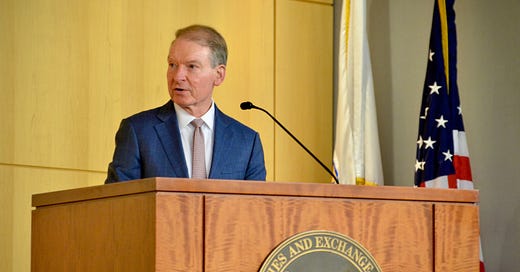The case for scoping out (much of) defi from the Exchange Act
In the final roundtable held by the SEC’s crypto task force on Monday – which focused on defi – SEC Chair Paul Atkins said in his opening remarks that he has directed staff to “consider a conditional exemptive relief framework or ‘innovation exemption’ that would expeditiously allow registrants and non-registrants to bring on-chain products and services to market.”
In a speech in May, Commissioner Hester Peirce also floated the idea of a potential exemption from registration that would allow firms to use blockchain-based protocols to issue, trade, and settle tokenized securities.
If the SEC follows through, the exemption would be consistent with how the Commission has historically viewed software providers and communications protocols. Many defi activities and participants clearly fall outside the scope of the Exchange Act – but of course, facts and circumstances still matter.
There is no general intermediation requirement under the Exchange Act
The Exchange Act does not mandate the use of intermediaries (except in highly limited contexts mostly related to derivatives) – peer-to-peer securities trading is lawful. Obviously, transacting in this way is more difficult when parties do not already know and trust each other – parties face significant settlement and credit risks when changes in ownership take place manually.
Public blockchains permit parties to transact with each other peer-to-peer while self-custodying their assets using open-source software. Although public blockchains can be used by individuals, organizations, associations, or groups of persons to issue and/or facilitate the trading of securities, the technology does not inherently require the involvement of such intermediaries. Public blockchains use software (i.e. “smart contracts”) to transfer crypto assets simultaneously against payment.
Developers who write and deploy “smart contracts” are not intermediaries under the Exchange Act
Despite the fact that public blockchains enable parties to transact peer-to-peer, critics often counter that there is still human involvement and that smart contracts cannot be deployed on a public blockchain in the absence of human activity, or code that is controlled or developed by humans.
But that is not enough to satisfy the requirements for registration under the Exchange Act. The definition of “exchange” under the Exchange Act requires that there be an “organization, association, or group of persons” who “constitutes, maintains, or provides a market place or facilities for bringing together” buyers and sellers. In other words, there must be an intermediary actively involved (i.e., “bringing together” securities buyers and sellers) in order for registration to be required. Passively publishing or deploying software on a public blockchain does not rise to this level.
That said, some smart contracts may not be immutable and may instead be “upgradeable.” These smart contracts have an admin key and can be under the control of an individual or group. The analysis will be different for defi protocols that use upgradeable smart contracts versus those that use non-upgradeable ones (such as Uniswap). When Uniswap “upgrades” to new versions, the upgrades take the form of deploying new, immutable smart contracts that are not under the control of Uniswap Labs (e.g. Uniswap v4).
Historically, the SEC has viewed communications protocols as outside the scope of the Exchange Act
The SEC has historically distinguished between systems that have requirements and parameters that are designed with securities trading in mind, and those merely provide general connectivity for persons to communicate and negotiate trades for securities (e.g. chat apps/interfaces).
Defi protocols are not typically designed explicitly with securities trading in mind. Although they may contain parameters to enable parties to exchange value, such as price and quantity, the same is true for many other general-purpose technologies (e.g. auction software and e-commerce).
Developers or publishers of defi protocols should not be required to police the potential use of the protocol for securities trading. This would undermine the neutrality that is the foundation of the modern Internet and also presents potential constitutional issues.
In addition, order execution management systems (“OEMS”) have generally been viewed to be outside of the scope of the Exchange Act. Many defi protocols function similarly to OEMS technology. It is true that in the crypto context we may have a fully peer-to-peer, retail transaction, whereas in the tradfi context where OEMS are being used we are usually talking about two registered brokers or registered investment advisers transacting. But a defi protocol should not be treated differently just because it is available openly and freely. There is nothing in the statute that says general connectivity technologies can only be used if both parties are market professionals or registered with the SEC.
These are my own views, and do not necessarily represent those of my employer. This content is provided for informational purposes only, and should not be relied upon as legal, business, investment, or tax advice. You should consult your own advisers as to those matters.





